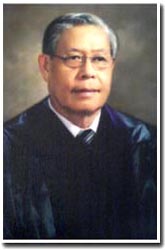| Oposa v. Factoran Minors Oposa | |||||
|---|---|---|---|---|---|
 | |||||
| Court | Supreme Court of the Philippines en banc | ||||
| |||||
| Decided | July 30, 1993 | ||||
| G.R. number | 101083 | ||||
| Citation | 296 Phil. 694 224 SCRA 792 | ||||
| Case history | |||||
| Appealed from | Makati Regional Trial Court Branch 66: Minors Oposa v. Factoran (Civil Case No. 90-77) | ||||
| Ponente | Hilario Davide, Jr. | ||||
| Court membership | |||||
| Judges sitting | Andres Narvasa (Chief Justice), Hilario Davide Jr., Isagani Cruz, Teodoro Padilla, Abdulwahid Bidin, Carolina Griño-Aquino, Florenz Regalado, Flerida Ruth Pineda-Romero, Rodolfo A. Nocon, Josue Bellosillo, Jose Melo, Camilo Quiason, Florentino P. Feliciano, Reynato Puno, Jose C. Vitug | ||||
| Majority | Davide, Jr., joined by Cruz, Padilla, Bidin, Griño-Aquino, Regalado, Romero, Nocon, Bellosillo, Melo, Quiason | ||||
| Concurrence | Feliciano | ||||
| Narvasa, Puno, Vitug took no part in the consideration or decision of the case. | |||||
Oposa v. Factoran, 296 Phil. 694 (1993), alternatively titled Minors Oposa v. Factoran or Minors Oposa, is a landmark decision of the Supreme Court of the Philippines recognizing the doctrine of intergenerational responsibility on the environment in the Philippine legal system. The case is a contributor to the development of international environmental law.
